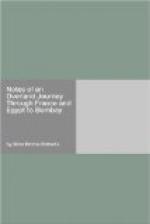The villagers at Metunga, and other places, make as much hay as their fields will supply for their own use, and have hit upon a singular method of stacking it. They choose some large tree, and lodge the hay in its branches, which thus piled up, assumes the appearance of an immense bee-hive. This precaution is taken to preserve the crop from the depredations of cattle, and, if more troublesome, is less expensive than fencing it round. From the miserably lean condition of many of the unfortunate animals, which their Hindu masters worship and starve, it would appear that, notwithstanding its seeming abundance, they are very scantily supplied with hay. It is a pity that some agriculturist does not suggest the expedience of feeding them upon fish, which, as they are cleanly animals, they would eat while fresh.
CHAPTER XII.
* * * * *
BOMBAY—(Continued).
* * * * *
The Climate of Bombay treacherous in the cold season—The land-wind injurious to health—The Air freely admitted into Rooms—The Climate of the Red Sea not injurious to Silk dresses—Advice to lady-passengers on the subject of dress—The Shops of Bombay badly provided—Speculations on the site of the City, should the seat of Government be removed hither—The Esplanade—Exercise of Sailors on Shore and on Ship-board—Mock-fight—Departure of Sir Henry Fane—Visit to a fair in Mahim Wood—Prophecy—Shrine of Mugdooree Sahib—Description of the Fair—Visit to the mansion of a Moonshee—His Family—Crowds of Vehicles returning from the Fair—Tanks—Festival of the Duwallee—Visit to a Parsee—Singular ceremony—The Women of India impede the advance of improvement—They oppose every departure from established rules—Effect of Education in Bombay yet superficial—Cause of the backwardness of Native Education.
Every day’s experience of the climate of Bombay assures me that, in what is called the cold season, at least, it is the most treacherous in the world; and that, moreover, its dangers are not sufficiently guarded against by the inhabitants. Cold weather, such as takes place during the period from November to March, in all parts of Bengal, is not felt here, the days being more or less sultry, and tempered only by cold, piercing winds.
The land-wind, which blows alternately with the sea-breezes, comes fraught with all the influences most baneful to health; cramps, rheumatic pains, even head-aches and indigestion, brought on by cold, are the consequences to susceptible persons of exposure to this wind, either during the day or the night: so severe and so manifold are the pains and aches which attend it, that I feel strongly inclined to believe that Bombay, and not “the vexed Bermoothes,” was the island of Prospero, and that the plagues showered upon Caliban still remain. Though the progress of acclimation can scarcely fail to be attended by danger to life or limb, the process, when completed, seems to be very effectual, since little or no pains are taken by the old inhabitants to guard against the evil.




